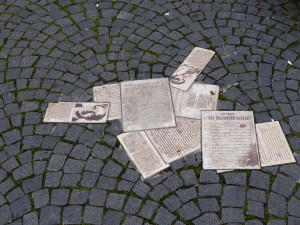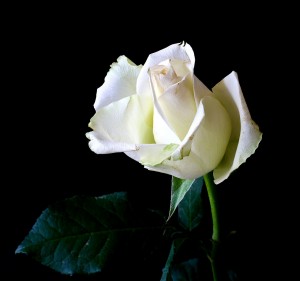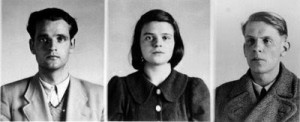This blog was (2015 post) and is dedicated to the memory of Sophie Scholl and all those who, along with her, harnessed the courage to stand against evil. I have a sense that it is time to urgently resurrect the spirit of what was known as the White Rose. May the people rise.
“Stand up for what you believe in even if you are standing alone!”
Sophie Scholl
If you take a stroll through beautiful Munich, Germany, it is hard to imagine that this place was once the official and ideological stronghold of the NAZI Party (NSDAP) leading up to World War II. For visitors who are aware of the historical shadows that the city holds, the reminders are never far away. On the pavement, outside the main building of the Ludwig-Maximilians-Universität, one of Germany’s oldest universities, is a strange memorial of what looks like the hasty scattering of
papers inset into the pavement. When you walk inside the atrium you will find a statue of a girl: Sophie Scholl.

Sophie, born on 9 May 1921, was the daughter of the mayor of Forchtenberg, Robert Scholl. She enjoyed a fairly carefree childhood, raised in a household that held to a Christian faith which recognised the dignity and equality of all people. Her father’s words would play an instrumental role in shaping who Sophie was becoming: “What I want for you is to live in uprightness and freedom of spirit, no matter how difficult that proves to be.“ Her father and brothers were critical of Hitler and the regime. Nevertheless, Sophie joined a Nazi organisation, the League of German Girls, where she became a squad leader at the age of twelve. Her initial enthusiasm began to wane as she became more immersed in understanding the ideology and motivation of the Nazi party and as she began to observe the treatment of Jews.

Sophie graduated from Secondary School in 1940 and worked as a kindergarten teacher at the Frobel Institute. In 1942, she enrolled in the University of Munich as a student of biology and philosophy. Undergirded by her studies and her faith, she joined her brother and his friends who held similar political views and who increasingly opposed the Nazi regime. Humanist and writer, Theodor Haecker, was a major influence on her resistance ideology.

In 1942, she became part of the
White Rose student resistance that was founded by her brother, Hans, along with Willi Graf and Christoph Probst. The group sought to awaken an apathetic Germany to the Nazi tyranny and its genocidal policies. The group wrote six anti-Nazi resistance leaflets and distributed them across Munich. Sophie played a key role in the distribution because as a woman she was less likely to be stopped by the SS. Using a hand-operated duplicating machine they produced between six to nine thousand copies of each pamphlet, which also appeared in Stuttgart, Cologne, Vienna, Freiburg, Chemnitz, Hamburg, and Berlin.
Here are some
excerpts from these pamphlets:
The first of the six leaflets produced by The White Rose movement opens, “Nothing is so unworthy of a civilized nation as allowing itself to be ‘governed’ by an irresponsible clique that has yielded to base instinct.” The White Rose became a relentless voice that endeavoured to awaken the apathy that had come over Germany in the face of such heinous governmental evil.
The second leaflet asked, “Why do the German people behave so apathetically in the face of all these abominable crimes … so unworthy of the human race?” And this: “Since the conquest of Poland, 300,000 Jews have been murdered, a crime against human dignity … Germans encourage fascist criminals if no chord within them cries out at the sight of such deeds. An end in terror is preferable to terror without end.” The White Rose was desperately trying to incite people to action, to awaken a nation to realise that the combined collective of the German people was greater than the evil they faced.
The third leaflet boldly welcomed all to the movement, declaring that “Everyone is in a position to contribute to the overthrow of this system.” Please note, they never called for a violent rebellion, rather, for passive resistance, a peaceful sabotage. “Why do you allow these men who are in power to rob you step by step, openly and in secret, of one domain of your rights after another, until one day nothing, nothing at all will be left but a mechanised state system presided over by criminals and drunks? Is your spirit already so crushed by abuse that you forget it is your right – or rather, your moral duty – to eliminate this system?”
The fourth leaflet appealed to the religious instincts of the German people with a defiant call to action: “I ask you as a Christian … Has God not given you the strength, the will to fight? We must attack evil where it is strongest, and it is strongest in the power of Hitler.” The fourth pamphlet’s concluding paragraph also became the motto of the resistance: “We will not be silent. We are your bad conscience. The White Rose will not leave you in peace!“
On the 18th February 1943, the Scholls distributed leaflets in the Munich University, leaving them in empty corridors and lecture rooms. Sophie stood on the top level of the atrium and threw handfuls into the hall below. They were immediately arrested and after a three day trial with no jury, found guilty of treason. On the 22nd February, Sophie, her brother Hans and their friend, Christoph Probst, were condemned to death and beheaded in Munich’s Stadelheim Prison.
Sophie’s last words were to declare that God was her eternal refuge and, “Die Sonne scheint noch” – “The sun still shines”. Hans Scholl was remembered as saying, “Es lebe die Freiheit” – “Long live Freedom”.
The final White Rose leaflet was smuggled out of Germany and intercepted by Allied forces, with the result that, in the autumn of 1943, millions of copies were dropped over Germany by Allied aircraft. I wonder what a defeated Germany thought as these papers rained from the sky, the voice of prophets and martyrs, begging them to take courage? I can only imagine the regret as they realised that they would be remembered as a generation that remained quiet in one of the darkest moments of history.
I wonder what our generation will be remembered for? Locking kids in cages? Concentration camps for the most vulnerable? Fear and slander against marginalised communities? The destruction of our planet by greedy governments and corporations?
May the White Rose rise … may courage win the day.

“The real damage is done by those millions who want to ‘survive.’ The honest men who just want to be left in peace. Those who don’t want their little lives disturbed by anything bigger than themselves. Those with no sides and no causes. Those who won’t take measure of their own strength, for fear of antagonizing their own weakness. Those who don’t like to make waves — or enemies. Those for whom freedom, honour, truth, and principles are only literature.”
– Sophie Scholl






Thank you for sharing this. What an amazing young woman. The last quote of hers is very thought provoking.
Yes – I can’t stop thinking about it. How easy to prefer safety. Her courage was incredible.
Such incredible bravery and what a powerful story.